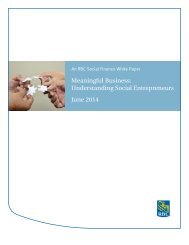Accelerating our Impact: Philanthropy, Innovation and Social Change
Create successful ePaper yourself
Turn your PDF publications into a flip-book with our unique Google optimized e-Paper software.
<strong>Social</strong> change leaders <strong>and</strong> funders recognize that thinking comprehensively is essential:<br />
piecemeal approaches will not work. Effective social change requires:<br />
• a long-term commitment;<br />
• a willingness to take risks;<br />
• the ability to work across sectors <strong>and</strong> silos;<br />
• investments in strategic research <strong>and</strong> policy analysis.<br />
However, as with a focus on growth, the mere presence of these factors does not guarantee<br />
success. Maximizing an innovative program’s potential for community engagement<br />
<strong>and</strong> progressive impact calls for an underst<strong>and</strong>ing of how these factors are interrelated<br />
<strong>and</strong> the role each plays in the highly dynamic process of social transformation.<br />
Toward this end, there are two conceptual frameworks that we have found particularly<br />
illuminating. One is the panarchy model of transformation in human <strong>and</strong><br />
ecological systems; the other is complexity theory. They serve as ways to think about<br />
the context <strong>and</strong> dynamics of social change processes <strong>and</strong> the role that philanthropy<br />
can play.<br />
1.1<br />
The Ecocycle or<br />
Panarchy Model<br />
14







